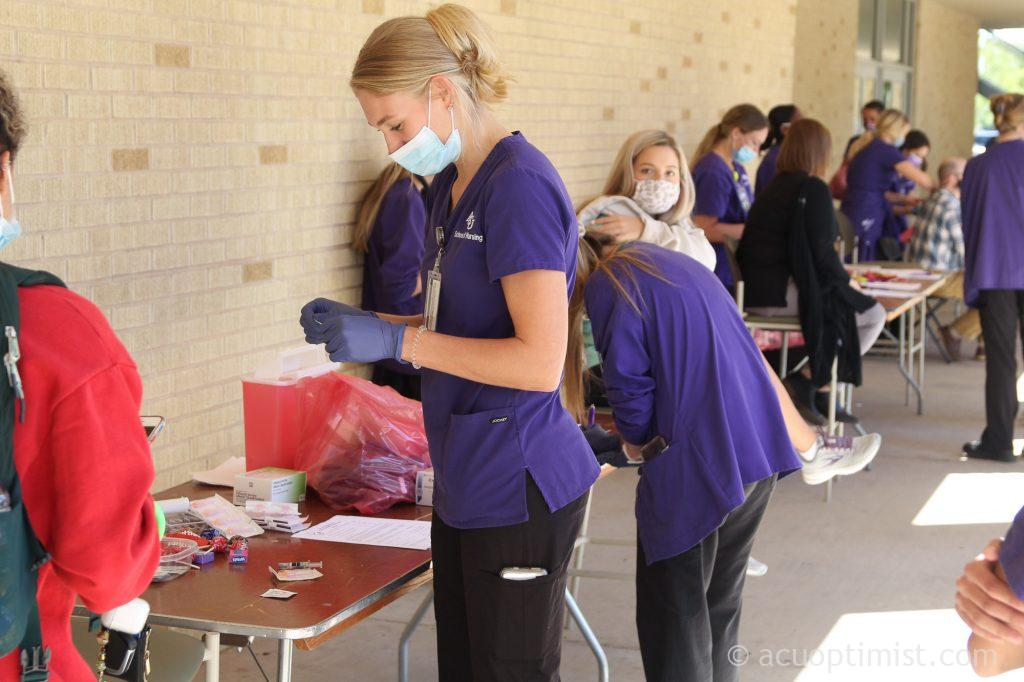Students from the school of nursing over the past several weeks have started or returned to their clinical rotations at medical centers and hospitals across Abilene.
During their clinicals, nursing students have the opportunity to shadow several nurses in different specialties. They have the opportunity to interact with patients and get real-life experiences regarding what they learn in their classes.
Though nursing students still get to experience their clinical, the arrival of COVID-19 caused many things to change. Lindsey Watkins, a senior nursing major from Frisco, began her clinical before the pandemic started last year and has seen how much the pandemic has affected nursing.
“Before, clinicals were very laid-back and relaxed, and there weren’t a lot of rules or procedures we have to follow,” Watkins said. “Now, we’re not allowed to interact with patients who have diagnosed Covid. When we do interact with patients, we have to do so in a cautious way, and the precautions we did have are taken to a whole new level.”
Students in clinicals have to take several precautions when working in the hospital. They get to the hospital at 6:30 a.m, get their temperatures taken and wear N95 masks at all times along with surgical masks under them, among other things. Students are asked to bring as little as possible and constantly wash their hands, while there is also a limit to how many people can be in rooms.
Sabrina Anthony, a junior nursing major from Houston, who’s in her second semester of clinicals, has first-hand experience in how taxing clinicals have been, with the pandemic playing a huge role.
“There are so many different precautions and standards of care we used to know,” Anthony said, “but now those standards have been elevated. Everything is about being a lot more clean and precautious, keeping staff and patients safe as well as the family allowed in the hospital.”
Watkins thinks that a lot of these changes to nursing will stick around even after the pandemic ends. But in her eyes, that is for the better.
“Due to COVID, nursing, in general, will be a lot safer,” said Watkins. “People have tended to get lenient on patient care, but since Covid, people have realized it is important to remain safe and do everything in your power to keep yourself and your patients safe. Holistically, nursing care on the emotional and physical side will continue to improve because of the pandemic.”
Despite the pandemic changing many guidelines and standards for clinicals and nursing, students still have the chance to grow and receive valuable learning opportunities.
“Everything you learn in class starts to come to fruition in clinicals,” Anthony said. “You get to make and observe mistakes, but that is how we best learn. It’s so tangible, physical, and it’s a great way to apply what we learn at school.”
Some students, like Preston Moss, a junior nursing major from Phoenix, Arizona, are just entering their clinicals and have already had opportunities to observe and apply what they have learned in the classroom.
“I only have one week under my belt,” said Moss, “but just being there to interact with a few patients, seeing some procedures going on was cool. It was great to be with nurses who have been practicing and have gone through nursing school, and know what we are going through.”
Even though clinicals are challenging, especially during the pandemic, nursing students said they have been satisfied with their career choice. Anthony is one of those students.
“For anyone planning on joining nursing, one of the best experiences is clinical,” said Anthony. “It can be tough at times, and you feel like you want to quit, but the moment you step in the hospital, everything fits right into place. You realize that nursing is the thing you want to do.”
Watkins said one of her favorite parts of clinicals has been interacting with patients, especially during the pandemic.
“It’s been pretty cool to get to hear patients’ stories and be a part of that with them,” said Watkins. “Especially since everyone is going through something due to Covid. It has been really interesting to hear their stories and care for these patients going through a difficult time.”
Watkins encouraged students, whether nursing or general, to not let undesirable circumstances define themselves and how they look at things.
“Be adaptable, and try to strive for excellence, no matter the circumstances,” said Watkins. “You could let the pandemic define you, but try to choose to look at it from a different outlook. Continue to be good and confident in what you do, and don’t let the situation define how you interact with patients or people.”

